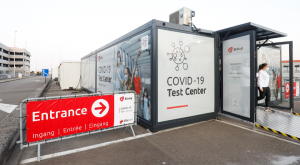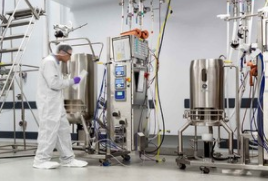 SAB Biotherapeutics has developed a first-of-its-kind therapeutic engine—unleashing the power of the body’s native biological defense system to produce immunotherapies that truly match and overpower the complexity, diversity, and evolution of human disease.
SAB Biotherapeutics has developed a first-of-its-kind therapeutic engine—unleashing the power of the body’s native biological defense system to produce immunotherapies that truly match and overpower the complexity, diversity, and evolution of human disease.
This new class of immunotherapies opens the door to new medicines that are safer, more effective, and longer lasting than current antibody therapies.
SAB Biotherapeutics (SAB), a clinical-stage biopharmaceutical company, advancing a new class of immunotherapies leveraging the native human immune response, announced today it has been awarded a contract from the U.S. Department of Defense (DoD) to develop and test a Rapid Response Antibody Program, valued at up to $27 million.
This progressive and competitive, three-stage, multi-year contract calls for the development of a state-of-the-art, pharmaceutical platform technology capable of rapidly and reliably producing antibody-based Medical Countermeasures (MCM) for biological threats. The goal of the program, awarded through DoD’s Joint Program Executive Office for Chemical, Biological, Radiological, and Nuclear Defense (JPEO-CBRND) Joint Project Lead CBRND Enabling Biotechnologies (JPL-CBRND-EB), is to accelerate the delivery of potent, human, polyclonal antibody therapeutics to address known and novel emerging biodefense (viral, bacterial or toxin) threats.
Driven by advanced genetic engineering and antibody science, SAB has developed the DiversitAb™ platform to naturally and rapidly produce large amounts of targeted human antibodies, without human donors.
Stage 1 of the contract, totaling $3.4 million, began in September of 2019 and continues through May 2020; demonstrating the platform’s potential to meet the DoD’s requirements for producing safe and efficacious cGMP material in less than six months at current scale. Stage 2 increases the scale of production to meet the DoD’s target number of doses of prototype drug product and fully-implemented demonstration of readiness. Stage 3 calls for production of an antibody product to an unknown threat, selected by the DoD in a “live fire” exercise as well as clinical activity through a Phase 1 trial.
“We have an obligation to apply our proprietary capabilities to produce high-potency immunotherapies to virtually any target on a large scale, to a rapid response capacity,” said Eddie J. Sullivan, PhD, SAB Biotherapeutics president, CEO and co-founder. “Our therapies leverage the native immune response thereby providing a highly-specific match against the complexity, diversity and mutation of disease.”
The company has developed more than a dozen effective antibodies from its DiversitAb platform in response to infectious disease targets during outbreaks of Ebola, Zika, Dengue and others.
“For a new disease target, we’re able to move quickly to a proof-of-concept in about 90 days,” added Sullivan.
“Infectious disease has been a strategic proving ground for our platform,” added Sullivan. “If we can perform under the most demanding of scenarios to challenging targets, it builds confidence that translates to a broader array of therapeutic programs,” Sullivan said.
SAB is also advancing a therapeutic pipeline including potential treatments for autoimmune diseases, inflammation, infectious diseases and cancers. The company recently entered a research collaboration with CSL Behring to explore new innovative immunotherapies, including human immunoglobulins.
“This initiative is solidifying a place for targeted human polyclonal antibodies in the immunotherapy space, showcasing the power of the native human biological immune response,” added Sullivan. “More importantly, we’re providing an innovative new tool in the medical countermeasures toolbox.”
Source: SAB Biotherapeutics
 The purpose of the study proposed by the International Journal of Behavioral Nutrition and Physical Activity was to develop new measures that assess the availability, utilization, and stability of food security, in addition to the USDA’s Household Food Security Survey Measure (HFSSM).
The purpose of the study proposed by the International Journal of Behavioral Nutrition and Physical Activity was to develop new measures that assess the availability, utilization, and stability of food security, in addition to the USDA’s Household Food Security Survey Measure (HFSSM).








